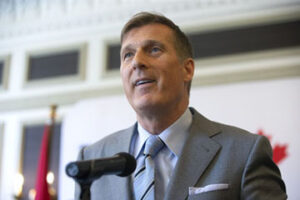Maxime Bernier promises federalist alternative
By Lethbridge Herald on March 30, 2021.
 People's Party of Canada Leader Maxime Bernier speaks from a podium at an announcement in Toronto on Friday, June 21, 2019. THE CANADIAN PRESS/Chris Young
People's Party of Canada Leader Maxime Bernier speaks from a podium at an announcement in Toronto on Friday, June 21, 2019. THE CANADIAN PRESS/Chris YoungTim Kalinowski
Lethbridge Herald
tkalinowski@lethbridgeherald.com
People’s Party of Canada leader Maxime Bernier spoke at a special session of the Southern Alberta Council on Public Affairs YouTube livestream speaker series on Tuesday.
During his speech, and in the question-and-answer period following his presentation to SACPA, Bernier kept a very narrow focus reserving his first remarks for potential Alberta separatists who may be disaffected by the current parties in power in Ottawa, and later promising a radical federalist alternative which decentralized even more powers to the provinces. He also took square aim at the Conservative Party of Canada under the leadership of Erin O’Toole by attempting to lump O’Toole in with Justin Trudeau, and appealing to those who may be disaffected by that leader’s current drift toward the middle.
“What are your options at the federal level if you want to change from the disastrous Trudeau regime? First of all you can vote for Erin O’Toole’s Conservative Party. As much as you may want to get rid of Trudeau, voting for the CPC will change absolutely nothing,” Bernier said.
“The Conservatives don’t want to solve Canada’s structural problems. They don’t even acknowledge they exist.”
“There is very little substantive difference between them and the Liberals,” he later added in the same vein.
“They have accepted the current rules of the game, and they have consoled themselves with the dominant ideological trends.”
What are those “ideological trends” according to Bernier? He rejected the notion systemic racism exists in Canada with the exception, he stated, of the Indian Act. He acknowledged that is a policy which must be abolished while respecting the Treaties. He rejected any notion Canada should sign on to the United Nations Declaration on the Rights of Indigenous Peoples, or in any way be bound by international agreements like the Paris Accord. Bernier said he does not believe race or identity politics should be a factor in any policy in Canada, and that “all lives matter,” and all newcomers coming here should have, in his words, “Western values.”
He later said his federal vision on Climate Change would be to have no policy position on Climate Change, leaving it up to individual provinces to do what they care to on that issue.
He said he would reform health care so that it remains universal, but allow patients to choose public or private options.
He promised increased autonomy for provinces in the Canadian federation, and smaller government in Ottawa.
With just the lightest populist touch, Bernier repeatedly returned in his remarks to the notion that, in his party’s view, individual liberties and freedoms are increasingly under threat in liberal democracies like Canada, and raised the spectre of a big federal government increasingly encroaching on the rights of its citizens.
The former Conservative Party of Canada cabinet minister and MP, Bernier, has stated many of these positions before, and did so in the last federal election before ultimately losing his own seat in Quebec to a candidate from his former party.
But as noted previously, during Tuesday’s SACPA session Bernier was not speaking to those who disagree with him or his party’s policies. He spent far more time, for example, criticizing the Conservative Party and dismissing the upstart Maverick Party of Canada, his nearest rival for courting support based on Western alienation, than he did bashing the Trudeau Liberals.
“Everybody is moving to the left or far left,” Bernier stated at one point, “including the Conservative Party. All the other parties want to drive us into a wall at different speeds. I want to stop the car and change direction.”
But in a moment with slightly less rhetorical flourish, Bernier also acknowledged the reality his party won only 1.6 per cent of the popular vote in the last federal election. He was asked by a SACPA attendee what he hoped to achieve as a realistic result in the next federal election? He felt a doubling of the 2019 election result would be realistic, or about four or five per cent of the popular vote. He also stated a realistic goal would be to win his own seat back, and perhaps a few others across Canada, to start building some momentum toward the future.
“I can say that half of the population of Canada do not know we exist,” he stated. “That’s a big challenge.”
Follow @TimKalHerald on Twitter
-1




